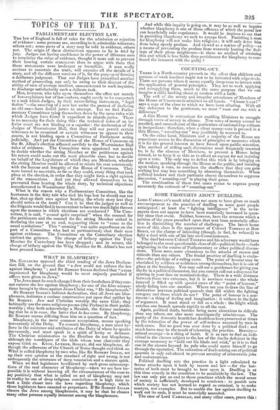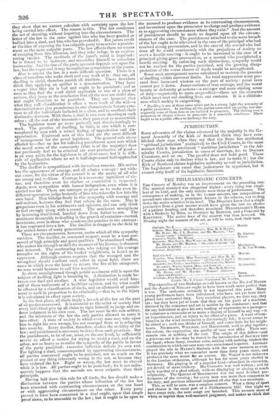SOME THOUGHTS ABOUT DUELLING.
Loan CARDIGAN'S mock trial does not seem to have given so much encouragement to the practice of duelling as some good people anticipated : at least the " fighting intelligence " in the news- papers does not appear to have been materially increased in quan- tity since that event. Neither, however, have the sermons which a portion of the press preached upon that text been materially effec- tive in diminishing the number of challenges. The latest home news of this class is the appearance of Colonel TORRENS at Bow Street, on the charge of intending (though, in fact, he refused) to fight a duel with one of his late co-Commissioners.
The duel between Colonel TORRENS and his adversary would have belonged to the most questionable class of all—political duels—duels originating in the course of Parliamentary or other political discus- sions. These seem more obnoxious to the attacks of reason and ridicule than any others. The feudal practice of duelling is exclu- sive—the privilege of a ruling caste. The point of honour may be cherished by soldiers or noblemen among themselves, but it is out of place at the hustings. You may call out a gentleman for giving you the lie in a political discussion, but you cannot call out a drayman for spitting in your face on nomination-day. There is a wide distance between these two extremes, but it is nowhere vacant : the whole interval is filled up with special cases of the " point of honour," nicely fading into one another. Where are you to draw the line of distinction between political quarrels that fall within the fighting category and those which do not ? The point of honour is a sen- timent—a thing of feeling and imagination : it withers in the light of argument. It must stand or fall as a whole : the blight which catches one branch spreads rapidly to all the rest.
Again, political duels, besides being more obnoxious to ridicule than any others, are also more unmitigatedly mischievous. The purity of the domestic hearth has doubtless been preserved at times by the toleration of the power of self-redress assumed by men in such cases. But no good was ever done by a political duel ; and much harm may be the result of tolerating the practice. Bravery— animal courage—is a thing of habit. It is as rare to find an indi- vidual in the classes subject to the law of the duello deficient in the courage necessary to "hold out his blade and wink," as it is to find one in the classes beyond its pale who could nerve himself to go through the operation. The toleration of duels arising out of political quarrels is only calculated to prevent scrutiny of aristocratic jobs and malversations.
Political duelling sets the practice in a light calculated to favour attacks upon it both by reason and law —for the bat- teries of both must be brought to bear upon it. Duelling is at this time exactly in the condition to be assailable by the law. The law can only put an end to those practices which the moral sense of society is sufficiently developed to condemn : to punish acts which society has not learned to regard as criminal, is to make martyrs, not examples. But to enable the law against duelling to work out its ends, it must be materially amended. The case of Lord CARDIGAN, and many other cases, prove this : they show that we cannot calculate with certainty upon the law being carried into effect. The reason is this. The law condemns the act of shooting, without inquiring into the circumstances. The letter of the law is the same against him who has been goaded or bullied into a dud, and him who has provoked it. But jurors revolt at theidea of exposing the less culpable party to as severe a punish- meat as the more culpable party. The law affords them no means of escaping from this dilemma, and they take refuge in an equivo- cating verdict. The rectitude of the juror's mind is impaired : he is forced to be insincere, and reconciles himself to conscious insincerity. And the fate of the party accused depends not upon the law, but the vague and it may be capricious sympathies of the jurors.
How to amend the law, is a more difficult question. There is a class of moralists who make short and easy work of it : they say, all duelling is sinful, therefore punish all duellists. These moralists think that applying an epithet is a demonstration. They have a vague idea that sin is bad and ought to be punished ; and as soon as they fiud the word sinful applicable to one of a class of actions, they jump at the conclusion that all the rest are sinful also, and ought therefore to be punished. They are ignorant that what they call classification is often a mere work of the will—a determination to give prominence to one characteristic feature com- mon to all the individuals included in a class, and to overlook their distinctive features. With them, a duel is two men shooting at each other ; all the rest of the transaction they pass over as unessential.
The legislator must go more patiently and discriminatingly to work. The practice of duelling, he finds, is one which is con- templated by men with a mixed feeling of approbation and dis- approbation. Equivocal acts of this kind arc the most difficult of management for the penal legislator. T he general rule above alluded to—that no law for inflicting punishment upon acts which the moral sense of the community (that is of the majority) does not previously feel to be criminal are ever productive of good— is an easy guide for the legislator in all clear cases, but it is diffi- cult of application where an act is half-deprecated half-applauded by the bystanders. The duellist is sympathized with for various reasons. His action has the appearance of courage, and all admire courage : not with- out cause, for the virtue of the coward is at the mercy of all who are strong and reckless. Courage is a necessary ingredient of vir- tue, and therefore even its shadow or counterfeit is respected. Again, men sympathize with honest indignation, even when it is carried too far. There are outrages so gross as to make even in- different spectators judge leniently of him who takes the law into his own hand. Men indulge freely in this sympathy with courage and self-redress, because they feel that others do the same. Man is gregarious even in his sentiments and opinions, and can only think or feel strongly along with a crowd. The sentiment strengthens by becoming traditional, handed down from father to son. The sentiment favourable to duelling is the growth of centuries—rooted, inveterate, even in those who condemn the practice in the abstract : it has vegetated into a law. The duellist is dragged to the field by the united forces of many generations.
There are circumstances, however, under which all this sympathy vanishes. The duellist, to command respect, must be a man pos- sessed of high principle and good qualities. The abandoned ruffian, who makes his strength or skill the measure of his licence, is shunned and detested. The overbearing man, who relying on his courage tramples on the rights of his weaker neighbours, is hated as an oppressor. Although custom requires that the wronged and the wrongdoer should confront each other in equal fight, there are cases in which were the latter to return the fire of his antagonist, no man would hesitate to call him murderer.
In short, unenlightened though public sentiment still is upon the subject of duelling, light is breaking in. A distinction is made be- tween one duel and another. A wise legislator would avail him- self of these rudiments of a healthier opinion, and try what could be effected by a classification of duels, and an allotment of punish- ment to each in proportion to its criminality—that is, to the injury it is calculated to effect upon society.
In the first place, all duels imply a breach of the law on the part of all parties concerned. It is essential to the order of society that every individual give up all claim to right himself, to judge and en- force judgment in his own case. The law must be the sole arbiter, and the ministers of the law the only parties allowed to carry it into effect. A state of society in which every man may take upon him to right his own wrongs, has not emerged from or is relapsing into anarchy. Every duellist, therefore, shakes the stability of the law ; and punishment is necessary to deter from such practices. But the punishment, to be of use, must, on the one hand, be sufficiently severe to afford a motive for trying to avoid a duel, and on the other, not so heavy as to enlist the sympathy of the public in favour of the party punished: excessive infliction defeats its own end. For fighting a duel, unaccompanied by aggravating circumstances, all parties concerned ought to be punished, not so much ou the ground of any thing inherently wrong in the act, as because they have violated the law. Right or wrong, the law must be obeyed while it is law. All parties ought to be punished ; for it not unfre- quently happens that the seconds are more culpable than their principals. Having laid down this rule for all duels, the law should make a distinction between the parties whose infraction of the law has been attended with extenuating circumstances on the one hand or with aggravating circumstances on the other. Every party proved to have been concerned in a duel ought, upon that simple proof alone, to be amenable to the law ; but it ought to be open to
the accused to produce evidence as to extenuating circumstances, and incumbent upon the prosecutor to charge and produce evidence as to aggravating circumstances where they exist.* And the amount of punishment should be made to depend upon all the circum- stances of the case. The punishment attached to the mere breach of the law ought to be alleviated in the case of the principal who had received strong provocation, and in the case of the second who had done all he could consistently with the prejudices of society to avert a hostile meeting : it ought to be increased in the case of a principal giving gross provocation, or a second who precipitated a hostile meeting. By enforcing such distinctions, sympathy would not be excited for the parties punished, and the growing disap- probation of the worse classes of duels would be strengthened.
Some such arrangement seems calculated to restrain the practice of duelling within narrower limits. Its total suppression must pro- ceed from increased wisdom on the part of society : penal laws cannot put it down. Juster notions of true courage, and the moral beauty or deformity pf actions—a stronger and more abiding sense of duty—superiority to mere stage-effect—these are the elements which must root out duelling from our customs. It is a childish- ness which society is outgrowing.
• Duelling is one of those cases which put in a strong light the necessity of a public prosecutor. In duelling all the parties concerned are guilty, and con- sequently none of them dare or are inclined to prosecute. The binding over a policeman or chance witness to prosecute is a miserable substitute. There ought to be a public officer to discharge the duty.



























 Previous page
Previous page